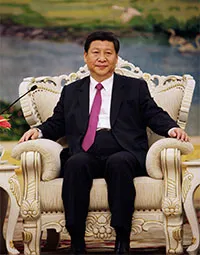It was only a matter of time before Chinese Vice President Xi Jinping’s physical absence from the public view was accompanied by his disappearance from cyberspace. The characters “Jinping” from his name were censored today from searches of Sina’s microblog service Weibo, according to the Fei Chang Dao blog. Where else but China does a deficiency of information about a nonappearance become a story worth deleting?
So is there a story or isn’t there? International news reports say that Xi, President Hu Jintao’s expected successor, has not been seen in public since Sept. 1, and missed a Sept. 5 meeting scheduled with U.S. Secretary of State Hillary Clinton. That was either a snub, a swimming injury, a stroke, or an assassination attempt, depending on who you talk to. Xi has missed other appointments too, though the full extent of his truancy remains unclear.
Also on Sept. 5, he skipped sessions with Prime Minister Lee Hsien Loong of Singapore and a Russian official, according to a Hong Kong South China Morning Post report published Sept. 6. This week, he failed to show up for Danish Prime Minister Helle Thorning-Schmidt, although she told Reuters the meet was never scheduled.
It’s hard to imagine a U.S presidential nominee vanishing for nearly two weeks, though as the Communist Party’s internal candidate, Xi’s appointment does not depend on public opinion. As only one of nine on the governing Politburo Standing Committee, his individual status is also less significant than many other up-and-coming world leaders. Xi’s fellow Standing Committee member He Guoqiang disappeared too, from August 23 until today, when he visited a newspaper publisher, Reuters reported. Still, for Xi to cancel on Clinton and others looks bad, and the Foreign Ministry press briefing is woefully ineffectual when it comes to diffusing suspicion. “I have no information to offer you on this,” and “I hope you can ask a serious question,” are highlights from spokesman Hong Lei’s treatment of the Xi Jinping mystery this week, according to international news reports. It’s hard to imagine an explanation for Xi’s absenteeism that would be more harmful to China’s image than this stonewalling.
Cue the rumors. China has a particularly bad record when it comes to releasing information about rulers and their personal lives. That, and an engaged online citizenry, creates the ideal environment for speculation. Forget Jiang Zemin’s non-heart attack last year. Think Bo Xilai, back in the day when his murder-corruption saga was still breaking. The showy trial of Bo’s wife, Gu Kailai, for poisoning British citizen Neil Heywood, is a reminder that even the most unlikely-sounding rumors on the Chinese Internet could turn out to be true. Or, at least, that the story propaganda officials disseminate is sometimes barely more credible than the gossip that preceded it.
News consumers are left unsatisfied. Conspiracy theories abound. Public trust is undermined, and political leaders slighted. For a country that has invested so much capital and manpower in managing information, China is doing a miserably poor job.
UPDATE: The name of the blog Fei Chang Dao has been corrected.
